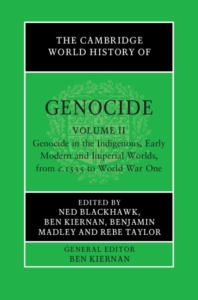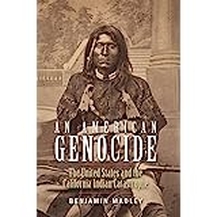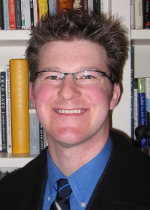Benjamin Madley
Biography
Benjamin Madley is an historian of Native America, the United States, and colonialism in world history. Born in Redding, California, he spent much of his childhood in Karuk Country near the Oregon border where he became interested in relationships between colonizers and Indigenous peoples. Educated at Yale and Oxford, he writes about Native America as well as colonialism in Africa, Australia, and Europe, often applying a transnational and comparative approach.
Madley has authored or co-authored more than twenty journal articles and book chapters. His articles have appeared in The American Historical Review, California History, European History Quarterly, Journal of British Studies, Journal of Genocide Research, Pacific Historical Review, and The Western Historical Quarterly. His most recent article appeared in The Journal of American History.
Yale University Press published his first book, An American Genocide: The United States and the California Indian Catastrophe, 1846-1873. This book received the Los Angeles Times Book Prize for History, the Raphael Lemkin Book Award from the Institute for the Study of Genocide, the Charles Redd Center / Phi Alpha Theta Award for the Best Book on the American West, the California Book Awards Gold Medal for Californiana, the Heyday Books History Award, and the Norman Neuerburg Award from the Historical Society of Southern California. It was also named a New York Times Book Review Editor’s Choice, an Indian Country Today Hot List book, a Choice magazine Outstanding Academic Title, and a Caroline Bancroft History Prize Honor Book. True West Magazine named Madley the Best New Western Author of 2016. In 2018, he received the California Commendation Medal from the Military Department of the State of California. According to former California Governor Jerry Brown, “Madley corrects the record with his gripping story of what really happened: the actual genocide of a vibrant civilization, thousands of years in the making.”
Madley also co-edited The Cambridge World History of Genocide, Volume 2: Genocide in the Indigenous, Early Modern, and Imperial Worlds, 1535-1914 (Cambridge: Cambridge University Press, 2023), with historians Ned Blackhawk, Ben Kiernan, and Rebe Taylor.
During the 2023-2024 academic year, Madley was Visiting Professor of Indigenous Law at the University of California College of the Law, San Francisco. He has held long-term fellowships at the Huntington Library and the Swedish Collegium for Advanced Study.
Publications
BOOKS
Ben Kiernan, series ed., Ned Blackhawk, Ben Kiernan, Benjamin Madley, and Rebe Taylor, volume eds., The Cambridge World History of Genocide, Volume II: Genocide in the Indigenous, Early Modern and Imperial Worlds, c.1535 to World War One (Cambridge: Cambridge University Press, 2023).

An American Genocide: The United States and the California Indian Catastrophe, 1846-1873 (New Haven: Yale University Press, 2016).

JOURNAL ARTICLES
“‘Aloha with Tears’: Native Hawaiians in the California Gold Rush, 1848-1860,” The Journal of American History 111:1 (June 2024), 39-70.
“California Unbound: Redefining the ‘End’ of Unfree Labor in the Pacific World and Beyond,” California History 100:3 (Autumn 2023), 24-56, co-authored with Professor Edward D. Melillo of Amherst College.
“California’s First Mass Incarceration System: Franciscan Missions, California Indians, and Penal Servitude, 1769-1836,” Pacific Historical Review 88:1 (January 2019), 14-47.
“Genocide in the Golden State: A Response to Reviews by William Bauer, Jr., Margaret Jacobs, Karl Jacoby and Jeffrey Ostler,” Journal of Genocide Research 19:1 (March 2017), 154-163.
“Understanding Genocide in California under United States Rule, 1846-1873,” The Western Historical Quarterly 47:4 (Winter 2016), 449-461.
“Reexamining the American Genocide Debate: Meaning, Historiography, and New Methods,” The American Historical Review 120:1 (February 2015), 98-139.
“‘Unholy Traffic in Human Blood and Souls:’ Systems of California Indian Servitude under U.S. Rule,” Pacific Historical Review 83:4 (November 2014), 626-667.
“California’s Yuki Indians: Defining Genocide in Native American History,” The Western Historical Quarterly 39:3 (Autumn 2008), 303-332.
“From Terror to Genocide: Britain’s Tasmanian Penal Colony and Australia’s History Wars,” Journal of British Studies 47:1 (January 2008), 77-106.
“From Africa to Auschwitz: How German South West Africa incubated ideas and methods adopted and developed by the Nazis in Eastern Europe,” European History Quarterly 35:3 (July 2005), 429-464.
“Patterns of Frontier Genocide, 1803-1910: The Aboriginal Tasmanians, the Yuki of California, and the Herero of Namibia,” Journal of Genocide Research 6:2 (June 2004), 167-192.
BOOK CHAPTERS
“Introduction,” co-authored with Ben Kiernan and Rebe Taylor, in Ben Kiernan, series ed., Ned Blackhawk, Ben Kiernan, Benjamin Madley, and Rebe Taylor, volume eds., The Cambridge World History of Genocide, Volume II: Genocide in the Indigenous, Early Modern and Imperial Worlds, c.1535 to World War One (Cambridge: Cambridge University Press, 2023), 1-20.
“‘Too Furious’: The Genocide of Connecticut’s Pequot Indians, 1636-1640,” in Ibid., 215-242.
“‘A War of Extermination’: The California Indian Genocide, 1846-1873,” in Ibid., 412-433.
“The Third Vector: Pacific Pathogens, Colonial Disease Ecologies, and Native American Epidemics North of Mexico,” in James Beattie, Ryan Tucker Jones, and Edward Dallam Melillo, eds., Migrant Ecologies: Environmental Histories of the Pacific World (Honolulu: University of Hawai‘i Press, 2023), 68-85.
“The Genocide of California’s Yana Indians [Revised and Expanded],” in Samuel Totten, ed., Centuries of Genocide: Critical Essays and Eyewitness Accounts (Toronto: University of Toronto Press, 2023), 12-53.
“California Indians,” in Jon Butler, ed., Oxford Research Encyclopedia of American History (New York: Oxford University Press, 2021): https://oxfordre.com/americanhistory/view/10.1093/acrefore/9780199329175…
“California and Oregon’s Modoc Indians: How Indigenous Resistance Camouflages Genocide in Colonial Histories,” in Andrew Woolford, Jeff Benvenuto, and Alexander Laban Hinton, eds., Colonial Genocide in Indigenous North America (Durham: Duke University Press, 2014), 95-130.
“The Genocide of California’s Yana Indians,” in Samuel Totten and William S. Parsons, eds., Centuries of Genocide: Essays and Eyewitness Accounts (New York: Routledge, 2012), 16-53.
“Tactics of Nineteenth Century Colonial Massacre: Tasmania, California and Beyond,” in Philip G. Dwyer and Lyndall Ryan, eds.,Theatres of Violence: Massacres, Mass Killing and Atrocity Throughout History (New York: Berghan Books, 2012), 110-125.
“When ‘The World Was Turned Upside Down’: California and Oregon’s Tolowa Indian Genocide, 1851-1856,” in Adam Jones, ed., New Directions in Genocide Research (New York: Routledge, 2011), 170-196.
BOOK REVIEWS & REVIEW ESSAYS
Jeffrey Ostler, Surviving Genocide: Native Nations and the United States from the American Revolution to Bleeding Kansas (New Haven: Yale University Press, 2019), in The American Historical Review 126:1 (April 2021), 303-304.
“Command, Control, and Genocide: A Review of The Vandemonian War,” Journal of Genocide Research 20:3 (July 2018), 467-471.
Catherine M. Cameron, Paul Kelton, and Alan C. Swedlund, eds., Beyond Germs: Native Depopulation in North America (Tucson: The University of Arizona Press, 2015), in The Journal of American History 103:4 (March 2017), 1022-1023.
Deborah and Jon Lawrence, Violent Encounters: Interviews On Western Massacres (Norman: University of Oklahoma Press, 2011), in The Western Historical Quarterly 43:2 (Summer 2012), 224-225.
Saul Friedländer, The Years of Extermination: Nazi Germany and the Jews, 1939-1945 (New York: Harper Perennial, 2007), in Journal of Genocide Research 12:3 (Autumn 2010), 279-280.
Richard T. Stillson, Spreading the Word: A History of Information in the California Gold Rush (Lincoln: University of Nebraska Press, 2006), in The Western Historical Quarterly 39:1 (Spring 2008), 79-80.
Frank Baumgardner, Killing for Land in Early California: Indian Blood at Round Valley, 1856-1863 (New York: Algora Publishing, 2005), in The Americas 64:2 (October 2007), 279-280.
William D. Rubinstein, Genocide: A History (Harlow: Longman, 2004), in European History Quarterly 36:2 (April 2006), 332-334.
DOCUMENTARY FILM PARTICIPATION
Namibia: Genocide and the Second Reich, a 60-minute BBC documentary (first aired December 7, 2004).
Awards & Grants
- Robert W. Cherny Award from the Pacific Coast Branch of the American Historical Association for the best article in U.S. labor and political history published in the Pacific Historical Review and/or by any PCB-AHA member, 2020.
- Charles Redd Center / Phi Alpha Theta Award for the Best Book on the American West, 2018.
- California Commendation Medal from the Military Department, State of California, 2018.
- Norman Neuerburg Book Award from the Historical Society of Southern California, 2018.
- Los Angeles Times Book Prize for History, 2017.
- Raphael Lemkin Book Award from the Institute for the Study of Genocide, 2017.
- California Book Awards Gold Medal for Californiana, 2017.
- Caroline Bancroft History Prize Honor Book from the Denver Public Library, 2017.
- San Francisco Public Library Laureate, 2017.
- Choice magazine Outstanding Academic Title, 2016.
- True West Magazine Best New Western Author, 2016.
- Heyday Books History Book Award from Heyday Books Publishing, 2016.
- Phi Alpha Theta / Westerners International Dissertation Prize, 2010.
- Yale University Fredrick W. Beinecke Dissertation Prize, 2009.
- Arrell M. Gibson Award for best article of 2008, in any journal, on Native American History, 2009.
- Oscar O. Winther Award for best article of 2008 in The Western Historical Quarterly, 2009.
Graduate Students
COMMITTEE CHAIR
• William Wood, “California Indian Land Law: A History, 1769-1924,” UCLA History Ph.D. student. Mr. Wood is Professor of Law at Southwestern Law School.
• Maiya Verrone, “Invisible Activists: The Political Work of Black Women Activists in Gold Rush California, 1848-1861,” UCLA African American Studies M.A. (co-chair with Brenda Stevenson), 2024. Ms. Verrone is a History Ph.D. student at UCLA.
• Dr. Preston S. McBride, “A Lethal Education: Institutionalized Negligence, Epidemiology, and Death in Native American Boarding Schools, 1879-1934,” UCLA History Ph.D., 2020. Dr. McBride is Assistant Professor of History at Pomona College.
• Dr. Rhiannon Koehler, “High Grade Danger: Indigenous Political Cartoons and the Navajo-Hopi Land Dispute, 1973-2006,” UCLA History Ph.D., 2018. Dr. Koehler is a Lecturer at the Art Institute of Chicago.
• David Two Eagles Streamer, “A Fight for Food: The Assault on California Indian Food Ways, 1769-1873,” UCLA American Indian Studies M.A., 2018. Mr. Streamer is a Graduate Court Clerk, Intertribal Court of Southern California.
• Dr. Preston S. McBride, “A Blueprint for Death in U.S. Off-Reservation Boarding Schools: Rethinking Institutional Mortalities at Carlisle Indian Industrial School, 1879-1918,” Dartmouth College Cultural Studies M.A., 2013 (co-chair with Colin Calloway). Dr. McBride is Assistant Professor of History at Pomona College.
COMMITTEE MEMBER
• Dexter Walcott, “Architectures of Alienation: Freedom in the American Industrial Interregnum, 1803-1877,” Critical Studies of Architecture Ph.D. student, UCLA.
• Christian Ramirez, “The Divergent Paths of Popular Liberalism in Guerrero: Tixtla and Mochitlan during the Porfiriato and Mexican Revolution, 1876-1917,” History Ph.D. student, UCLA.
• Kabl Wilkerson, “Strength of the People: Blood Quantum and Federal Power in Nazi Germany and the United States, 1932-1936,” History Ph.D. student, Harvard University.
• Michael Buse, “Native Sons of the Golden West: Race, Place, Dispossession, and the California Heritage Movement,” History Ph.D. student, UCLA.
• Elizabeth Blackmore, “Rethinking the Columbian Exchange: Using Theoretical and Quantitative Modeling to Understand Transoceanic Pathogen Circulation in the Age of Steam and Sail,” UCLA Ecology and Evolutionary Biology M.A., 2023. Ms. Blackmore is a Ph.D. student at Yale University.
• Dr. Toulouse-Antonin Roy, “‘The Camphor Questions is in Reality the Savage Question’: The Japanese Empire, Indigenous Peoples, and the Making of Capitalist Taiwan, 1895-1915,” UCLA History Ph.D., 2020. Dr. Roy is a Social Studies and AP teacher at the Pacific American School.
• Dr. Jeremiah Sladeck, “Padres Discontentos: Franciscan Decline and the Failure of the California Mission System, 1785-1805,” UCLA History Ph.D., 2020. Dr. Sladeck is a Lecturer, University of California, Los Angeles.
• Dr. Harper Benjamin Keenan, “The Mission Project: A Study of Elementary School History Education in California,” Stanford University Education Ph.D., 2019. Dr. Keenan is Assistant Professor of Curriculum and Pedagogy, University of British Columbia.
• Dr. Max Flomen, “Cruel Embrace: War and Slavery in the Texas Borderlands, 1700-1840,” UCLA History Ph.D., 2018. Dr. Flomen is Assistant Professor of History, West Virginia University.
• Dr. Nanar Khamo, “Representations of Memory, Genocide, and Violence in Contemporary Francophone Fiction,” UCLA French and Francophone Studies Ph.D., 2018. Dr. Khamo is Visiting Assistant Professor of French, Pepperdine University.
• Dr. Kelly Leah Stewart, “(Re)wrighting and (Re)righting California Indian Histories: Legacies of Saint Boniface Indian Industrial School, 1890-1934,” UCLA American Indian Studies M.A., 2018. Dr. Stewart is Assistant Professor of American Indian Studies at California State University, Long Beach.
• Dr. Yve Chavez, “Indigenous Artists and Ingenuity at the California Missions after 1769,” UCLA Art History Ph.D., 2017. Dr. Chaves is Assistant Professor of Art History, University of Oklahoma.
• Damien Montaño, “Indigenous Artistic Expression in the Crossroads of Los Angeles: Adornment, Beautification, and Guerilla Jewelry,” UCLA American Indian Studies M.A., 2017. Mr. Montaño is an artist.
• Jacquelyn May Teran, “Colonial Order and the Origins of California Native Women’s Mass Incarceration: California Missions and Beyond,” UCLA American Indian Studies M.A., 2015. Ms. Teran is Director, Women’s Downtown Shelter.
• Chantal Walker, “Piyahu Nadu – Land of Flowing Waters,” UCLA American Indian Studies M.A., 2014. Ms. Walker is a History Ph.D. student at the University of California, Davis.
Collaborators
Madley co-authored “California Unbound: Redefining the ‘End’ of Unfree Labor in the Pacific World and Beyond” with Professor Edward D. Melillo of Amherst College. This article appeared in California History 100:3 (Autumn 2023), 24-54.
Madley co-edited The Cambridge World History of Genocide, Volume 2: Genocide in the Indigenous, Early Modern, and Imperial Worlds, 1535-1914 (Cambridge: Cambridge University Press, 2023) with Professor Ned Blackhawk of Yale University, Ben Kiernan of Yale University, and Rebe Taylor of the University of Tasmania. He also co-authored the introduction to this volume with Kiernan and Taylor.


